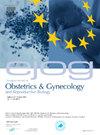分娩中胎儿健康的二线测试——爱尔兰共和国全国实践调查
IF 2.1
4区 医学
Q2 OBSTETRICS & GYNECOLOGY
European journal of obstetrics, gynecology, and reproductive biology
Pub Date : 2025-04-11
DOI:10.1016/j.ejogrb.2025.113973
引用次数: 0
摘要
目的本研究旨在评估产科医生对数字胎儿头皮刺激(dFSS)和胎儿血液采样(FBS)的看法,并建立他们在分娩时进行胎儿健康二线测试的报告做法。方法通过电子邮件和邮寄方式对爱尔兰共和国产科单位的每位实习产科医生和咨询产科医生进行调查。该调查探讨了目前的做法,对测试性能的看法,以及对异常产时心脏造影的临床情况的处理。结果共收到430名医生的177份回复(41%)。有一种看法认为,dFSS更容易(93%),执行速度更快(94%),但FBS是最可靠的测试(59% FBS, 5% dFSS, 22%无差异)。需要一个设计良好的随机对照试验来确定哪种测试效果最好(80%)。受训者参与此类试验的意愿高于顾问(91%对67%,p = 0.001)。在临床场景的报告实践中有明显的差异,在自由文本评论中表达了不同的观点。结论临床医生对dFSS和FBS的看法不同。这种对常用的产时检查的不确定性支持了随机对照试验的必要性,以便为每种检查的有效性提供强有力的证据。本文章由计算机程序翻译,如有差异,请以英文原文为准。
Second line tests of fetal wellbeing in labor – A national survey of practice in the Republic of Ireland
Objective
The aim of this study was to evaluate obstetricians’ views on digital fetal scalp stimulation (dFSS) and fetal blood sampling (FBS), and to establish their reported practice when performing second line tests of fetal wellbeing in labor.
Methods
A survey was distributed via email and post to every trainee and consultant obstetrician in maternity units in the Republic of Ireland. The survey explored current practice, views on test performance, and the management of clinical scenarios with abnormal intrapartum cardiotocography.
Results
We received 177 responses from 430 doctors (41 %). There was a perception that dFSS is easier (93 %) and faster to perform (94 %), but that FBS is the most reliable test (59 % FBS, 5 % dFSS, 22 % no difference). The need for a well-designed randomized controlled trial to determine which test performs best was recognized (80 %). Willingness to participate in such a trial was higher among trainees than consultants (91 % versus 67 %, p = 0.001). There was marked variation in reported practice for the clinical scenarios and diverse views were expressed within the free-text comments.
Conclusion
Perspectives on dFSS and FBS vary between clinicians. This uncertainty about commonly used intrapartum tests supports the need for randomized controlled trials to provide robust evidence on the effectiveness of each test.
求助全文
通过发布文献求助,成功后即可免费获取论文全文。
去求助
来源期刊
CiteScore
4.60
自引率
3.80%
发文量
898
审稿时长
8.3 weeks
期刊介绍:
The European Journal of Obstetrics & Gynecology and Reproductive Biology is the leading general clinical journal covering the continent. It publishes peer reviewed original research articles, as well as a wide range of news, book reviews, biographical, historical and educational articles and a lively correspondence section. Fields covered include obstetrics, prenatal diagnosis, maternal-fetal medicine, perinatology, general gynecology, gynecologic oncology, uro-gynecology, reproductive medicine, infertility, reproductive endocrinology, sexual medicine and reproductive ethics. The European Journal of Obstetrics & Gynecology and Reproductive Biology provides a forum for scientific and clinical professional communication in obstetrics and gynecology throughout Europe and the world.

 求助内容:
求助内容: 应助结果提醒方式:
应助结果提醒方式:


